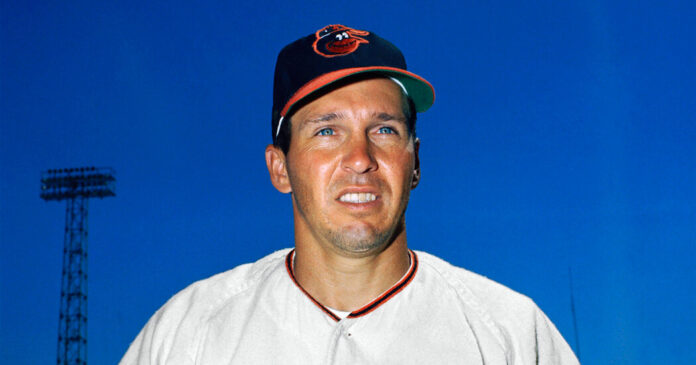Brooks Robinson, the Baltimore Orioles Corridor of Famer who was maybe the best third baseman in baseball historical past, has died. He was 86.
His demise was introduced by the Orioles in an announcement that didn’t embrace additional data.
In his 23 seasons with the Orioles, from 1955 to 1977, Robinson turned referred to as the Human Vacuum Cleaner for his potential to snare absolutely anything hit his manner.
Charging topped grounders or bunts, backhanding smashes, ranging to his left or his proper, he received 16 consecutive Gold Glove awards because the American League’s main fielder at third base. Solely the pitcher Greg Maddux, with 18 Gold Gloves, has exceeded Robinson’s whole.
Robinson performed on 4 pennant-winning groups, two of them World Collection champions. He was probably the most beneficial participant of the 1970 World Collection, during which the Orioles beat the Cincinnati Reds in 5 video games, for his spectacular performs and for his hitting: He had a .429 batting common and hit a pair of house runs. (The Orioles additionally beat the Los Angeles Dodgers in 4 video games within the 1966 Collection.)
Robinson had 2,848 hits, 268 house runs and a profession batting common of .267. He was the American League’s Most Invaluable Participant in 1964, when he hit 28 homers, had a league-leading 118 runs batted in and batted .317, all profession highs. However he was greatest identified for his fielding.
Robinson was named an All-Star each season from 1960 to 1974. He was elected to the Baseball Corridor of Fame in 1983, his first 12 months of eligibility, with virtually 92 % of the votes.
In an interview with the previous baseball commissioner Fay Vincent for his 2008 oral historical past, “We Would Have Performed for Nothing,” Robinson recalled that after the 1970 World Collection, “all of the writers have been ready on me to return to my locker,” however Rex Barney, the Orioles’ broadcaster, mentioned: “Properly, don’t fear about him. Simply interview his gloves. They’re quite a bit higher, and that’s who’s doing all of the work.”
Robinson wasn’t utilizing his World Collection glove the following 12 months. It had been transported to the Corridor of Fame.
Brooks Calbert Robinson was born on Could 18, 1937, in Little Rock, Ark., the place his father was a fireman and likewise performed semipro baseball. He listened to St. Louis Cardinals video games on the radio and grew decided to change into a serious league participant. Tossing tennis balls towards the steps of his household house hour after hour and grabbing the caroms, he taught himself to subject a baseball coming at him from all types of angles.
Signed by the Orioles’ group out of highschool, Robinson began out as a second baseman for his or her York, Pa., farm crew in 1955. However he was quickly switched to 3rd base, the place his marvelous reactions enabled him to corral hard-hit balls.
Robinson acquired into just a few video games with the Orioles in 1955 and 1956. Within the spring of 1957, Paul Richards, the crew’s supervisor, thought he discovered a flaw within the mechanics of Robinson’s backhand performs and requested George Kell, the longtime third baseman who was concluding his main league profession with the Orioles, to appropriate it.
However Kell famous that Robinson had not missed a ball hit to his backhand in six weeks of spring coaching. “He was already so good that there wasn’t a lot I might inform him,” Kell recalled in an interview with The Baltimore Solar in 2004.
Robinson performed 145 video games with the Orioles in 1958 (he hit a disappointing .238) and, after serving six months within the Arkansas Nationwide Guard and spending a lot of the 1959 season within the minor leagues, returned to the Orioles to remain in 1960.
With Robinson at third base and the longer term Corridor of Famer Luis Aparicio and later Mark Belanger, each sensible fielders, alongside him at shortstop for a lot of his profession, the left facet of the Orioles’ infield offered all of the help a pitcher might need.
“I at all times had nice hand-eye coordination and was blessed with the intuition to be the place the baseball was hit,” Robinson instructed Danny Peary for his ebook “We Performed the Sport” (1994).
“I wasn’t quick and I didn’t have a terrific arm,” he added, “but I compensated by rapidly getting my ft in place to throw and eliminating the ball faster than anybody else.”
Robinson complemented his pure skills with exhausting work.
He instructed Fay Vincent how he “labored on the sluggish hit, the topped balls or bunts.”
“I used to line up about 10 or 12 balls in a row,” he recalled. “You simply are available and decide one up and also you’d take one other step and decide one up and throw it.”
When Robinson retired, he held main league information for many video games, putouts, assists and double performs by a 3rd baseman, in addition to highest fielding share. He was later a tv broadcaster for the Orioles.
Details about his survivors was not instantly out there.
When Robinson entered the Corridor of Fame, Kell, a fellow Arkansas native, was inducted as effectively. (Robinson was chosen by baseball writers, Kell by the Veterans Committee.)
“Is Brooks the very best ever at third? Little question about it,” Kell instructed The Solar in 2004.
Sparky Anderson, who managed the Reds within the 1970 World Collection, discovered himself affected by all these certain hits that Robinson became outs.
“I’m starting to see Brooks in my sleep,” Investor’s Enterprise Each day mentioned Anderson remarked that October. “If I dropped this paper plate, he’d decide it up on one hop and throw me out at first.”
